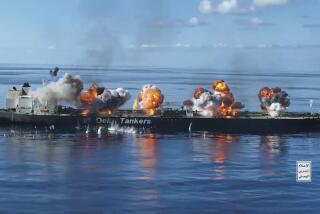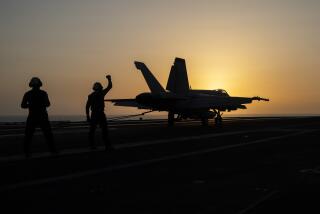Grappling with a forgotten scourge
- Share via
WASHINGTON AND LONDON — The Saudis chose to negotiate. The Indian navy opened fire. The U.S. navy said shipping companies should do more to protect their vessels, and the ship owners said governments should guard the high seas.
But everyone wants the barely functioning government of Somalia to control the pirates who sail from its ports to seize the cargo ships and tankers that ply past.
Mightily armed, but slightly baffled, 21st century civilization appears to have no collective answer to piracy, a scourge once considered banished into history.
“These are not just unskilled bandits,” said Russian navy spokesman Igor Dygalo. “Most likely we are dealing with two or even three pirate syndicates planning these attacks. They have very good sea communications and they’re well armed.”
Indian officials said Wednesday that a navy ship exchanged fire with a suspected pirate vessel before blowing it up in waters off the East African coast. And over the weekend, pirates took control of a Saudi oil tanker, leading to negotiations with the Saudi government.
Shipping and security officials say pirates are exploiting the maritime equivalent of what military officers on land call ungovernable spaces: vast, remote regions made lawless because of failed states, mostly out of the reach of international militaries. They find the ships fairly easy to capture, and many shipping companies are willing to pay lucrative ransoms to free hijacked crews and cargo.
Like the globe’s other piracy hot spot, the narrow Strait of Malacca between Malaysia and Indonesia, the Gulf of Aden is one of the most sensitive choke points in global commerce, a passageway for an array of valuable cargo such as oil, weapons and manufactured goods shuttling between Europe and Asia.
While the stable, comparatively wealthy Southeast Asian countries that line the Malacca Strait have committed their naval and coastal forces to stamping out hijackings and piracy, the Gulf of Aden is bordered by poor or dysfunctional countries like Djibouti, Yemen and particularly Somalia, home to a long-simmering civil war and a central government that barely exists.
“The area is much bigger,” said Rand Corp.’s Peter Chalk, author of a study on piracy and terrorism at sea. “You do not have that kind of regional cooperation now, and you have a huge void of governance in Somalia. All of those factors make dealing with this problem that much more difficult.”
That inability to deal with the problem risks halting maritime activity going from the Indian Ocean into the Red Sea. Already at least one major shipper, Norwegian oil and chemical tanker operator Odfjell, has announced that its 100-vessel fleet will no longer sail through the Gulf of Aden.
Others may soon follow. Shipping consultants have reported skyrocketing insurance premiums for ships passing through the waters between the Horn of Africa and the Arabian peninsula, with some estimating the costs rising as much as tenfold. BGN Risk, a British firm that analyzes corporate risk, said the additional costs to the shipping industry could total $400 million per year.
“The vast extension of the pirates’ reach will extend the area deemed as insecure by international shipping -- and more importantly by insurers,” wrote London-based energy analyst Samuel Ciszuk in a report for IHS Global Insight.
Many international shippers insist that it is not their role to fight pirates.
Vladimir Mednikov, vice president of Sovcomflot, Russia’s largest shipping company, said governments and the international community should secure the open seas.
“We are peaceful people. We are not in the business of war,” Mednikov said. “We are carriers of oil and gas and other commodities.”
Cyrus Mody, manager of the International Maritime Bureau in London, an arm of the International Chamber of Commerce, said his organization would like to see more naval stops of “mother vessels,” the base ships used by pirates as jumping-off points, which should then be confiscated.
But Pentagon Press Secretary Geoff Morrell said some of the blame must fall on the shippers themselves, who have not done enough to protect their cargo.
“I take issue with this whole notion that it’s incumbent upon the armed forces of the world, the navies of the world, to solve this problem,” Morrell said at a Pentagon news conference Wednesday. “The shipping companies also have an obligation to secure their ships, to prevent incidents such that we’ve been seeing at alarming rates over the past several months.”
Pentagon officials bristled at suggestions that the U.S. and allied navies have not actively pursued the suspected Somali pirates, arguing that a North Atlantic Treaty Organization task force in the region and other allied naval vessels have taken aggressive action to curtail their activities.
The officials said one of the principal reasons for establishing the U.S. military’s new Africa Command, formally inaugurated just last month, was to combat piracy both around the Horn of Africa and in the oil-rich Gulf of Guinea in West Africa.
The U.S. Navy says intelligence officials are watching for signs of terrorist involvement in piracy.
“Wherever there is big money, you will find terrorists,” said U.S. Navy Vice Adm. Bill Gortney, commander of all coalition navies in the region, though he added that the recent spate of piracy off Somalia shows no signs of links to international terrorists.
Coast Guard Capt. Phillip J. Heyl, the chief staff officer in Africom’s operations division, said the U.S. is highly reliant on local governments’ willingness and ability to improve their coastal defenses.
But military officials and experts also say even a stepped-up naval presence is unlikely to stop the piracy. With more than 20,000 ships estimated to be passing annually through the gulf, U.S. and NATO officials have acknowledged that their 14 allied naval ships off the Somali coast, including those from India and Russia, are simply not enough to provide escorts to all commercial vessels.
“We’re never going to get enough ships down there,” Gortney said.
NATO is scheduled to end its patrol of the gulf next month, at which point the European Union is expected to take over.
Roger Middleton, an Africa expert at the London-based think tank Chatham House, said the EU force was expected to number six or seven ships, but that leaders could agree to increase that number to about 10.
Military officials argue that the problem also must be addressed ashore in Somalia, where the pirates are organizing freely. Until then, private security companies are likely to ramp up their efforts to fill in the gaps.
Jeff Gibson, vice president for international training and operations at Blackwater Worldwide, said he has had inquiries from about 60 shippers and insurance companies. The North Carolina firm is preparing a presentation for potential clients in London next month, where among its offerings will be a 181-foot-long escort ship as well as certified mariners with small-arms training.
“The pirates are going after soft targets,” Gibson said. “If a ship is being escorted by another boat, or some small boats, or maybe even a helicopter overhead, [the pirates] are going to decide: Let’s not make the effort.”
Such practices run up against U.N. guidelines for operating commercial ships, however, and critics argue that armed guards on board -- who are not always visible to attacking pirates -- may lead to needless bloodshed without deterring potential attackers.
The U.N.’s International Maritime Organization distributed new guidance after the Sept. 11 attacks strongly discouraging any arming of commercial crews, saying such a move risks “escalating an already dangerous situation.”
--
henry.chu@latimes.com
Times staff writers Ronald D. White in Long Beach, Megan K. Stack in Moscow and Julian E. Barnes in Washington contributed to this report.
More to Read
Sign up for Essential California
The most important California stories and recommendations in your inbox every morning.
You may occasionally receive promotional content from the Los Angeles Times.














